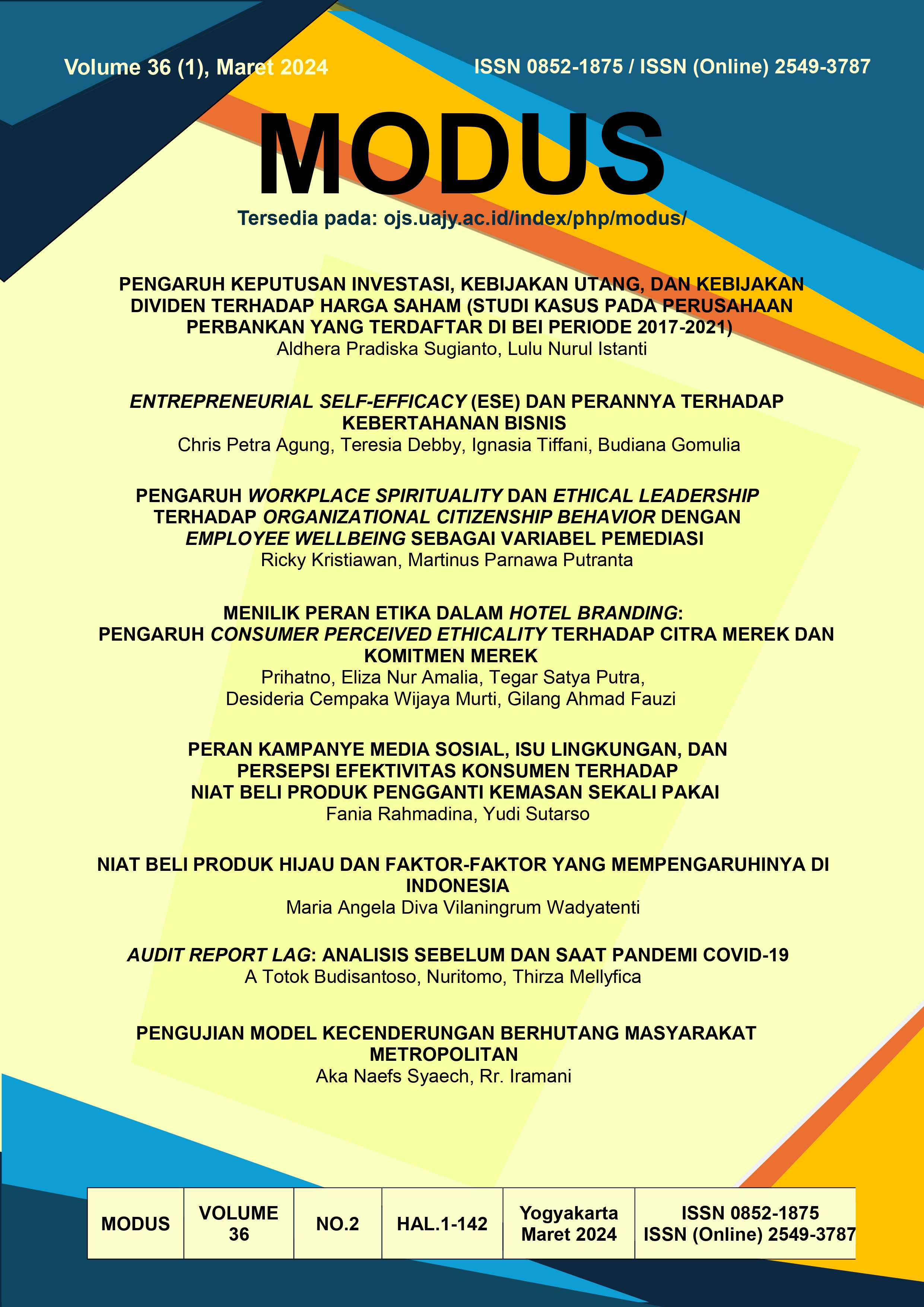MENILIK PERAN ETIKA DALAM HOTEL BRANDING: PENGARUH CONSUMER PERCEIVED ETHICALITY TERHADAP CITRA MEREK DAN KOMITMEN MEREK
DOI:
https://doi.org/10.24002/modus.v36i1.8238Abstract
In the hotel industry, competition is on the rise alongside the increase of international tourists to Indonesia, including the hotel industry in Yogyakarta. The competition drives hotels to meet consumer expectations. One primary expectation of consumers is an ethical image in business and production processes. Thus, Consumer Perceived Ethicality (CPE) has become a key focus in marketing and consumer behavior. CPE is defined as perception that a brand upholds honesty, accountability, and responsibility to stakeholders. Although research on CPE has been extensively conducted in America and Europe, studies within the Asian context are limited. Therefore, this research aims to explore the effect of CPE on brand identification and the impact of brand identification on brand image and commitment. This study employs an explanatory design with a sample of Royal Ambarrukmo hotel customers who have stayed at least twice. A total of 104 respondents were involved and data were analyzed using SEM-PLS. Findings show that CPE positively influences brand identification, which in turn positively affects brand image and commitment. These insights highlight the importance for hospitality businesses to understand and apply the CPE concept in their branding strategies. Future research should focus on how consumers form their opinions about the ethics of a brand.
Keywords: consumer perceived ethicality (CPE); brand identification; brand image; brand commitment; Royal Ambarrukmo.
Dalam industri perhotelan, persaingan semakin meningkat seiring dengan pertumbuhan kunjungan wisatawan mancanegara ke Indonesia, termasuk persaingan industri perhotelan di Yogyakarta. Ketatnya persaingan membuat hotel berlomba memenuhi ekspektasi konsumen. Salah satu ekspektasi utama konsumen saat ini adalah citra etik dalam bisnis dan proses produksi. Konsep Consumer Perceived Ethicality (CPE) telah menjadi sorotan utama dalam kajian pemasaran dan perilaku konsumen. CPE mengacu pada persepsi pelanggan bahwa suatu merek mengedepankan kejujuran, pertanggungjawaban, dan akuntabilitas kepada semua pemangku kepentingan. Meskipun banyak studi mengenai CPE telah dilakukan di benua Amerika dan Eropa, penelitian mengenai CPE di konteks benua Asia masih terbatas. Maka dari itu, penelitian ini bertujuan untuk mengetahui pengaruh CPE terhadap identifikasi merek dan dampak identifikasi merek pada citra merek serta komitmen merek. Penelitian ini menggunakan desain eksplanatori dengan sampel yang terdiri dari konsumen hotel Royal Ambarrukmo yang telah menginap minimal dua kali. Sebanyak 104 responden terlibat dan data diolah menggunakan SEM-PLS. Hasil menunjukkan bahwa CPE berpengaruh positif terhadap identifikasi merek, dan identifikasi merek berdampak positif pada citra dan komitmen merek. Temuan ini menunjukkan pentingnya bagi perusahaan di industri perhotelan untuk memahami dan memanfaatkan konsep CPE dalam strategi branding hotel. Untuk penelitian mendatang, disarankan untuk fokus pada bagaimana pendapat konsumen mengenai etika suatu merek.
Kata kunci: consumer perceived ethicality (CPE); identifikasi merek; citra merek; komitmen merek; Royal Ambarrukmo.
Downloads
Published
Issue
Section
License
Copyright (c) 2024 Modus

This work is licensed under a Creative Commons Attribution-ShareAlike 4.0 International License.















